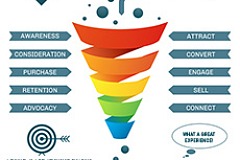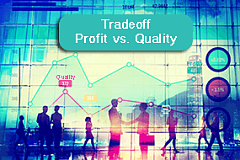 In the United States, about 1 in 12 businesses close each year. The owners and managers of those failed businesses may not have appreciated that the key to their business success was directly linked to the purpose of their companies.
In the United States, about 1 in 12 businesses close each year. The owners and managers of those failed businesses may not have appreciated that the key to their business success was directly linked to the purpose of their companies.
The purpose of your business is what drives its mission and how you share that purpose with your target customers is critical.
To fully understand this, let’s look at purpose and how to leverage it to your success.
What Is Purpose?
Many business owners might be under the assumption that the purpose of their business is to make money and keep investors happy. However, there's more to the story than that.
The real purpose of your business is to attract and retain your customers. Most of your business efforts, both in sales, operations, and marketing, should be focused on driving customers to your business and getting them to come back to buy more products and recommend you to their friends.
Why Is Purpose Important?
Having a business purpose is important for corporate success. While many people still think that you can measure a company by its stock price or assets, it's actually more than that. A lot of the value in a company is now determined by how unique it is and how invaluable it is to its customer.
People also consider the value that it'll bring to the market. Now, customers and investors are focusing even more on how you run your business and what your product and service are delivering for people. Investors want to see that your company can make a difference in the marketplace as well.
Other factors considered today include how the business makes a social impact. Does it focus on environmental factors and try to be a green company? Is it a culturally diverse and active company? Are there all kinds of growth opportunities within the business?
To meet those standards, you have to make sure that your employees feel that sense of purpose; when you hold your business owners and management accountable, the rest of the purpose will follow.
New Generations Care About Your Purpose
Millennials are one generation that is taking up a larger part of the market, and they do care about your business's values. They tend to support more businesses that have a well-defined purpose compared to those that don't have a business purpose.
That means that you'll be reaching one of the largest customer bases right now, but you'll also have free advertising.
When they like your services and products, they'll be more likely to refer them to someone else. It's also one of the least expensive marketing strategies that you can have, and you get it all just by having a good value proposition.
If that's not enough to convince you, one survey found that 82 percent of customers buy products with purpose in mind.
Employee Engagement
In addition to being one of the largest customer bases, millennials are also making up the largest part of the workforce for businesses. Because of that, many of them are also looking to work for companies that have a valuable mission statement.
They want to know that their work is going to mean something. The younger generations don't want to work for a company that has no purpose, therefore a positive company culture and strong purpose are very important to them. The payoff continues through productivity because the best work from employees happens when they realize that their work is meaningful and making a difference.
Having a good purpose also makes delegating easier. When the business grows, the expectations of employees need to be consistent and clear.
Further, a good purpose enhances employee recruiting and retention. It attracts recruits who are looking to work for a great company with values that align with their own. This is a great employer brand advertising strategy, and it's free.
How Do You Define Your Business Purpose
Now that you know how important a business purpose is, you need to learn how to define the purpose; business owners might want to start with the "why."
Investors and customers don't care about what you're selling or what you're offering. However, they care about why you're selling or offering it. For example, if you're selling dog treats, simply saying you sell dog treats isn’t enough.
Instead, maybe you tell customers that you started selling dog treats because you wanted to ensure that dogs had access to healthier or more organic treats.
You may also want to look at the example of Apple. While they sell iPhones and Macs, their company slogan of "Think different" is still relevant even today. They're selling a device, but they're also promising that you can use it as a way to express yourself.
This is one of the reasons that Apple is one of the biggest brands on the market. They're a valuable brand, and they're recognized because of their business purpose. They're more than just the products that they're selling.
Consider what challenges are relevant in society today and then figure out how you can address them. This is the underlying way to find the shared value of your purpose.
When you define your purpose, make sure that it's one you can stick to and be consistent. It needs to be believable, and the best way to do that is to ensure that the business owner and founder believe in it themselves. After that, everyone else will be able to buy into that purpose as well.
Discover More About Business Success
Purpose is the one key factor behind your business success, but many business owners still find it challenging to position their company with a valuable purpose.
Thankfully, we can help you out. We are business coaches and advisors with the tools, training, and experience to help your business creating a valuable purpose supporting it. And, we’ll also help you discover how to build off of your purpose to establish your vision, core values, and translate those into detailed action plans for your business.
Don’t delay, confusion costs. Book a call with me today. Brian Tracy USA: 877.433.6225 Email Me














